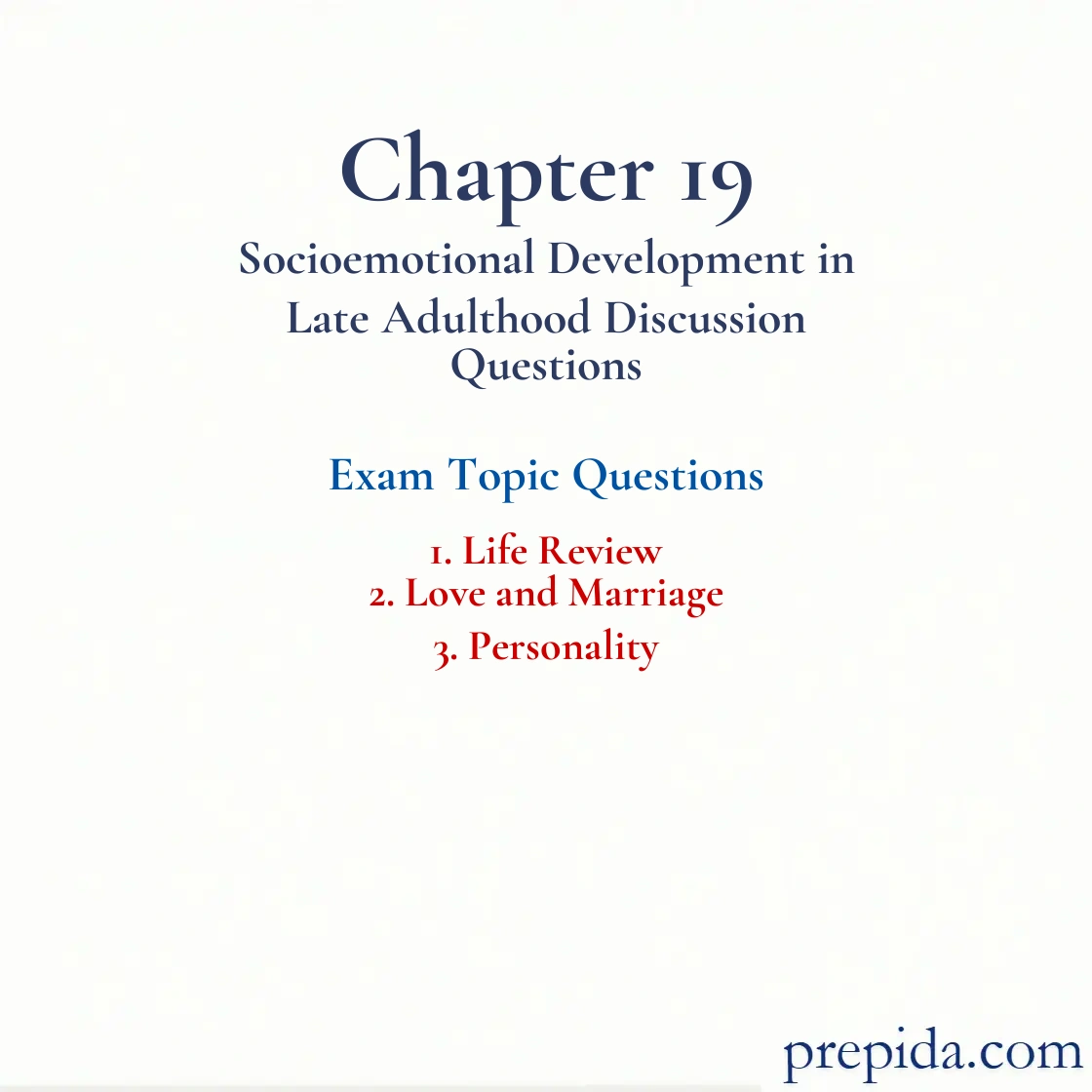
In the context of socioemotional development in late adulthood, which of the following is true of life review?
- It is the same for every individual.
- It is used to avoid the revival of negative thoughts.
- It is set in motion by looking forward to death.
- It is independent of interpersonal, relationship dimensions.
Emotion: Feeling, or affect, that occurs when a person is in a state or interaction that is important to him or her. Emotion is characterized by behavior that reflects (expresses) the pleasantness or unpleasantness of the state a person is in or the transactions being experienced.
Robert Butler states that life review is set in motion by
- retrospective glances on life's worth.
- looking forward to death.
- handing over the legacy to the next generation.
- conflicting views of wisdom against integrity.
Euthanasia: The act of painlessly ending the lives of persons who are suffering from incurable diseases or severe disabilities; sometimes called “mercy killing.” In euthanasia, the physician or a third party administers the lethal medication (active euthanasia) or withholds life-sustaining treatments.
Which of the following is prominent in Erikson's final stage of integrity versus despair?
- life review
- identity resolution
- integrity formation
- struggle for independence
Integrity Versus Despair: Erikson’s eighth and final stage of development, which individuals experience in late adulthood. This involves reflecting on the past and either piecing together a positive review or concluding that one’s life has not been well spent.
Life review
- suggests that many individuals will achieve greater life satisfaction if they continue their middle-adulthood roles into late adulthood.
- might result in increased meaning in life and mastery, but it also might revive bitterness and negative thoughts.
- revealed that those who were more physically active had higher life satisfaction and greater social interaction than their physically inactive counterparts.
- fails to consider sociocultural dimensions, such as culture, ethnicity, and gender.
Meaning-Making Coping: Involves drawing on beliefs, values, and goals to change the meaning of a stressful situation, especially in times of chronic stress such as when a loved one dies.
Ramya is an 80-year-old woman who suffers from dementia. She attends therapy sessions in which the clinician uses photographs and video recordings to encourage discussions about Ramya's past activities and experiences. The therapy sessions help reduce Ramya's depressive symptoms and improve her self-acceptance. Based on this information, it can be inferred that the clinician uses ________ therapy.
- gestalt
- reminiscence
- schema
- drama
Conscience: An internal regulation of standards of right and wrong that involves integrating moral thought, feeling, and behavior.
Clayton is a psychologist who runs a counseling center for older adults. In his center, the clients meet every week and form groups in which each individual narrates his or her past activities and events. Clayton encourages the members of the groups to share old photographs related to their life events and tell anecdotes about their experiences. This scenario illustrates the use of ________ therapy.
- cognitive behavioral
- past life regression
- reminiscence
- rational emotive
Conscience: An internal regulation of standards of right and wrong that involves integrating moral thought, feeling, and behavior.
Which of the following is likely to be an outcome of reminiscence therapy?
- improved motor skills
- financial independence
- physical well-being
- increased self-esteem
Self-Esteem: The global evaluative dimension of the self. Self-esteem is also referred to as self-worth or self-image.
Which of the following is referred to as the final stage in the marriage process?
- the time between marriage and impending divorce
- the time when the last child leaves home
- the time from retirement until death
- the time when older parents move into their children's homes
Life Expectancy: The number of years that will probably be lived by the average person born in a particular year.
During which stage in life are married individuals likely to find themselves having to care for a sick partner with a limiting health condition?
- middle adulthood
- early adulthood
- emerging adulthood
- late adulthood
Middle Adulthood: The developmental period that begins at approximately 40 to 45 years of age and extends to about 60 to 65 years of age.
Older adults characterized by ________ do not live as long as those who display ________.
- empathy; sympathy
- materialism; spiritualism
- negative affect; positive affect
- generosity; frugality
Emotion: Feeling, or affect, that occurs when a person is in a state or interaction that is important to him or her. Emotion is characterized by behavior that reflects (expresses) the pleasantness or unpleasantness of the state a person is in or the transactions being experienced.
According to new studies, which of the Big Five factors of personality was linked to an increased risk of older adults' developing Alzheimer disease across a 6-year time frame?
- high level of openness to experience
- moderate to high level of conscientiousness
- low to moderate level of agreeableness
- high level of neuroticism
Alzheimer Disease: A progressive, irreversible brain disorder characterized by a gradual deterioration of memory, reasoning, language, and eventually, physical function.
Identify the personality traits in the Big Five factors of personality that are associated with severe depression in older adults.
- low conscientiousness and extraversion and high neuroticism
- low religiosity and high materialism and humanism
- high agreeableness and low neuroticism and introversion
- high extroversion and low openness and materialism
Big Five Factors of Personality: Emotional stability (neuroticism), extraversion, openness to experience, agreeableness, and conscientiousness.
Studies on the Big Five factors of personality found that transition into late adulthood was characterized by increases in the aspects of impulse control, reliability, and conventionality. To which Big Five personality factor do these aspects belong?
- openness to experience
- neuroticism
- agreeableness
- conscientiousness
Conscience: An internal regulation of standards of right and wrong that involves integrating moral thought, feeling, and behavior.